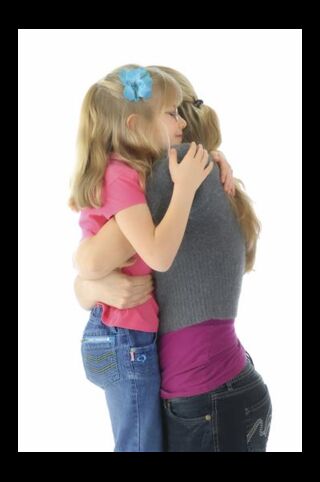"Choosing love seems to mean swallowing your kid's crap." - Philippe
My parenting mantra is "Choose Love." This reminds me that in any situation where fear is tightening its grip or anger is building toward an explosion, I can defuse the situation. I may not know what to do or say. I may be scared, or angry. But I always have the choice to turn away from fear or anger, to open the door and let love in.
I can't always pull this off, but when I can, it always transforms the situation. In fact, it can turn things around so completely that it feels miraculous.

Choosing love doesn't mean that you don't set limits: "No throwing sand..... Out of the sandbox."
It means that you aspire to be supportive rather than punitive: "You wish you could play in the sandbox. It was too hard for you to stop throwing sand. We'll try again tomorrow."
But choosing love DOES mean that you resist indulging your own temper, even when you're angry. Instead, you pull the camera back so that in addition to your own perspective, you see your child's. Maybe they're falling apart or lashing out because they're tired, or hungry, or jealous of their brother. Maybe they need you to put your phone down and connect with them. Maybe today's remote learning was just one zoom call too many. Or maybe you don't know why they're acting so obnoxious at this moment, so you take a deep breath and get curious and compassionate.
Of course, any child can sometimes drive their parent crazy, and some children can do it daily. It's a fact that every parent gets angry sometimes. But it's also a fact that children only gain the control to regulate their emotions, and therefore their behavior, when WE, their parents, demonstrate emotional regulation. After all, if we want our children to express their anger appropriately, we need to model that.
So yes, choosing love means that we notice the anger, swallow hard, and refrain from taking our anger out on our child. That's why it's common for parents who begin consciously choosing love to find themselves wondering if they're "swallowing crap" as Philippe said in the quote above.
But we're not actually swallowing our child's crap. Instead, we're noticing our own upset, which is making us overreact to our child. Choosing love doesn't mean we "swallow" that pain, which would be harmful to us. But it does mean that we refuse to take that old baggage and spew it out on our child.
How do we know this is old baggage? Because we're over-reacting, which means that we're triggered.
Even when our children provoke us, we're the role models. If we "lose it" with our kids, we heighten the drama and make everything worse. By definition, that is not in our best interest, or their best interest. It's not demonstrating for our child how to handle conflict constructively. If you weren't triggered, you would respond to your child's inappropriate behavior by calmly setting limits -- even while acknowledging your child's perspective -- which would help your child WANT to cooperate.
Children will often act thoughtlessly on their emotions even when it's not in their best interests; they don't have a fully developed prefrontal cortex. (Sometimes we call that being childish.) But we as adults only stoop to that level when we get triggered.
The definition of getting triggered is that old unconscious learning sounds an alarm, and we think we're in danger, so we go into "fight, flight or freeze." Our emotions grab control from the reasoning part of the brain.
Of course, your child did not install that trigger. It's been there inside you for a long time. In fact, our children, with their unerring instinct for pushing our buttons, give us the opportunity to notice and heal our old emotional baggage. And that's good news, because until we deal with our own suffering, we inevitably take it out on others. (That's the root of all violence in the world, including emotional violence.)
So what can we do instead of swallowing that suffering? Heal it! When you notice your anger mounting, take a breath and step away from your child.
1. Stop.
Resist acting. You're in fight or flight, so you'll feel like it's an emergency and you must take immediate action. Just resist speaking or moving.
2. Drop (your agenda, just for the moment, until you're calmer.)
While you're angry is not the time to make decisions. Don't let your mind get sucked into a storyline about why you're right, or how your own parent would have handled this situation. Instead, just focus on the sensations those big emotions are causing in your body.
3. Breathe.
Breathe into the physical discomfort.
Love yourself through it.
Sitting with our own pain is the hardest thing in the world. But when we allow ourselves to just notice the sensations in our body that signal an emotion -- without acting on the emotions, without attaching a story -- the emotions begin to fade away. Little by little, that old baggage begins to loosen its hold on us and to disappear.
Good! You've stopped yourself from being hijacked.
Now: Choose Love. See the situation from your child's perspective, with emotional generosity. Your child's actions may be unacceptable, but their feelings are always valid.
You can see the hard part of choosing love. When we're stuck in big emotions, they take on a life of their own. We feel righteously entitled to them. In that moment, we don't realize that we're overreacting.
So it takes courage to make the choice to turn away from those emotions, to turn toward love. Sometimes we worry that our child is "getting away with something." But all she's getting away with is showing us her own tangled emotions, her own pain. By listening and accepting her exactly as she is, we give her a chance to face that pain and work through it. So she doesn't have to carry it with her into adulthood, like so many of us did.
Of course, we talk with the child about appropriate behavior -- in other words, about not taking their emotions out on others -- once everyone calms down. But we start by modeling it right in that moment, right in the face of our child's messy emotions.
Miraculously, when we extend love -- when we accept our child's emotions with compassion, without getting angry ourselves, even while limiting behavior -- our child's big emotions begin to heal and settle.
So we don't need to swallow crap. Instead, we heal it. The miracle of this mindful approach is that it works just by bringing more consciousness to that old pain. Think of it as shining a light, and the shadows melt away.
Because when we refuse to visit our own pain on our child, we aren't only choosing love for our child. We're also choosing love for ourselves.




